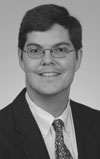Neurosciences welcomes
electrodiagnosis specialist
by Cindy
AbolePublic Relations
Helping to correctly diagnose patients with specific neuromuscular diseases while introducing the latest diagnostic evaluation techniques and treatments is the aim of neurologist David Stickler, M.D.
An assistant professor in the Department of Neurosciences since September, Stickler is a neuro-physiologist and is the director of both the MUSC Electromyography Lab (EMG) and Neuromuscular Service.
 Dr. David Stickler
Dr. David SticklerStickler brings clinical expertise to a patient population with growing needs and a newly evolved neurosciences department whose focus is the discovery and cure of disease and injuries affecting the brain and nervous system.
Stickler received his medical degree from West Virginia University in 1999. He completed a neurology residency and was neurology chief resident at the University of Florida. He completed yearlong fellowships in clinical neurophysiology and neuromuscular diseases at Duke University Medical Center. He is board certified in neurology and electrodiagnostic medicine and a member of the American Academy of Neurology and American Association of Neuromuscular and Electrodiagnostic Medicine.
“In evaluating my job options post fellowship, I realized that MUSC offered me a unique opportunity,” said Stickler. “MUSC’s Neurosciences Department provides a rare combination of specialties in neurology, neurosurgery and physiology/neuroscience research not found in many academic science centers. This environment places clinicians and researchers together for the potential promise of new discoveries and clinical applications to help patients.”
Under Stickler's direction, the EMG Lab performs nerve conduction studies and electromyography. A test is conducted to measure nerve and muscle function and to evaluate neuromuscular transmission, the communication between muscle and nerve. Stickler is specifically trained to conduct single-fiber EMG testing which is used to detect disorders of neuromuscular transmission including myasthenia gravis, an autoimmune condition where the body produces antibodies that interfere with normal neuromuscular transmission and causes multiple weaknesses from breathing and chewing problems to double vision.
“I hope to serve the local and statewide needs of patients with these types of conditions,” Stickler said, who will provide specialty testing through the lab and half-day, weekly clinics for patients.
The EMG lab operates by referral from fellow neurologists and specialists working in orthopaedics, rheumatology, neurosurgery, family and internal medicine, and other clinical departments.
He also sees patients in the Muscular Dystrophy Association (MDA) Clinic, assisting Mary Herring, M.D., in establishing a multidisciplinary team approach to care by bringing together physicians, physical therapists and occupational therapists to support patient needs.
Stickler will provide clinical support in a general neuromuscular clinic for patients diagnosed with general myopathy, neuropathy and neuromuscular disorders. There are also early plans to develop a clinic devoted to the diagnosis and management of Amyotrophic Lateral Sclerosis, commonly known as Lou Gehrig’s Disease. He also hopes to contribute and strengthen resident and clinical fellowship training in nerve conduction studies and electromyography through support in the neuromuscular clinics and the EMG lab.
Stickler's wife, Laura, is also a physician and assistant professor in the Department of Obstetrics and Gynecology working in the main hospital and the East Cooper Women’s Center.
Friday, Nov. 18, 2005
Catalyst Online is published weekly,
updated
as needed and improved from time to time by the MUSC Office of Public
Relations
for the faculty, employees and students of the Medical University of
South
Carolina. Catalyst Online editor, Kim Draughn, can be reached at
792-4107
or by email, catalyst@musc.edu. Editorial copy can be submitted to
Catalyst
Online and to The Catalyst in print by fax, 792-6723, or by email to
petersnd@musc.edu
or catalyst@musc.edu. To place an ad in The Catalyst hardcopy, call
Community
Press at 849-1778.